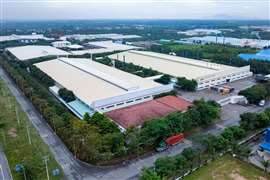Danfoss white paper urges swift action on equipment emissions
17 July 2023
A whitepaper from the Danish technology company Danfoss says CO2 emissions from construction equipment must be urgently reduced if the industry is to meet its climate goals.
 Danfoss’ whitepaper, Roadmap for Decarbonizing Cities, was launched at the UIA world Congress for Architects in Denmark. Image: Danfoss
Danfoss’ whitepaper, Roadmap for Decarbonizing Cities, was launched at the UIA world Congress for Architects in Denmark. Image: Danfoss
A whitepaper released by Danish technology company Danfoss states that construction equipment emissions – at approximately 400 million tonnes – are responsible for CO2 emissions equivalent to the global aviation industry.
Furthermore, according to Danfoss, excavators alone produce 50% of all emissions from construction machines.
The whitepaper, Roadmap for Decarbonizing cities, was launched at the UIA world Congress of Architects in Copenhagen.
At the event, Domenico Traverso, president of the Editron and Incubation division of Danfoss, stressed the importance of implementing energy-efficient technologies to reduce the carbon footprint of construction machines
Traverso said addressing the challenges of electrification while simultaneously reducing diesel consumption in excavators is key to achieving sustainability.
Complexity of electrification
According to the Danfoss whitepaper, while smaller vehicles and passenger cars can more easily transition to battery-electric models powered by renewable energy, the electrification of excavators and other heavy-duty vehicles presents greater complexity.
Excavators operate under demanding conditions and require longer working hours between charges, making it challenging to match the productivity of their diesel counterparts with large batteries.
This results in resource-intensive production processes and higher upfront costs, making the transition to electric excavators both technologically and economically unfeasible in many cases.
Additionally, the lack of necessary charging infrastructure at excavator work sites, especially in large sites such as quarries, poses logistical hurdles due to the weight of the batteries.
By improving efficiency, the reliance on large batteries, charging power demands, and renewable energy generation needs can be reduced.
During his statement, Traverso said, “The construction sector is very cost-sensitive, and we need to decarbonize in the most cost-effective way. Otherwise, it will not happen at scale. And this is where efficiency becomes a key enabler.”
The Danfoss Impact whitepaper explores the potential of readily available technologies that are transforming the construction industry and making low-emission construction sites a feasible reality.
 Domenico Traverso, president of the Editron and Incubation division of Danfoss
Domenico Traverso, president of the Editron and Incubation division of Danfoss
Currently, excavator systems, says the whitepaper, operate at only 30% efficiency, with 70% of engine energy wasted.
Alternative technologies
Danfoss highlights the significant energy reduction potential by implementing measures such as variable displacement pumps, digital displacement, variable speed pumps, decentralized drives, and energy recovery systems.
According to the company, these technologies can enhance efficiency, reduce energy consumption, and pave the way for electrification.
By implementing energy efficiency measures, says Danfoss, excavators can achieve more work with smaller engines and reduced fuel consumption, thereby decreasing the battery capacity required for electrification by up to 24.8%.
These measures could potentially deliver fuel savings of 15-30% in excavators weighing over 15 tonnes while simultaneously increasing their work capacity.
Danfoss states that, as the technology continues to evolve, these measures can be applied to excavators of all sizes, potentially achieving fuel savings of up to 50%.
POWER SOURCING GUIDE
The trusted reference and buyer’s guide for 83 years
The original “desktop search engine,” guiding nearly 10,000 users in more than 90 countries it is the primary reference for specifications and details on all the components that go into engine systems.
Visit Now
STAY CONNECTED




Receive the information you need when you need it through our world-leading magazines, newsletters and daily briefings.
CONNECT WITH THE TEAM













